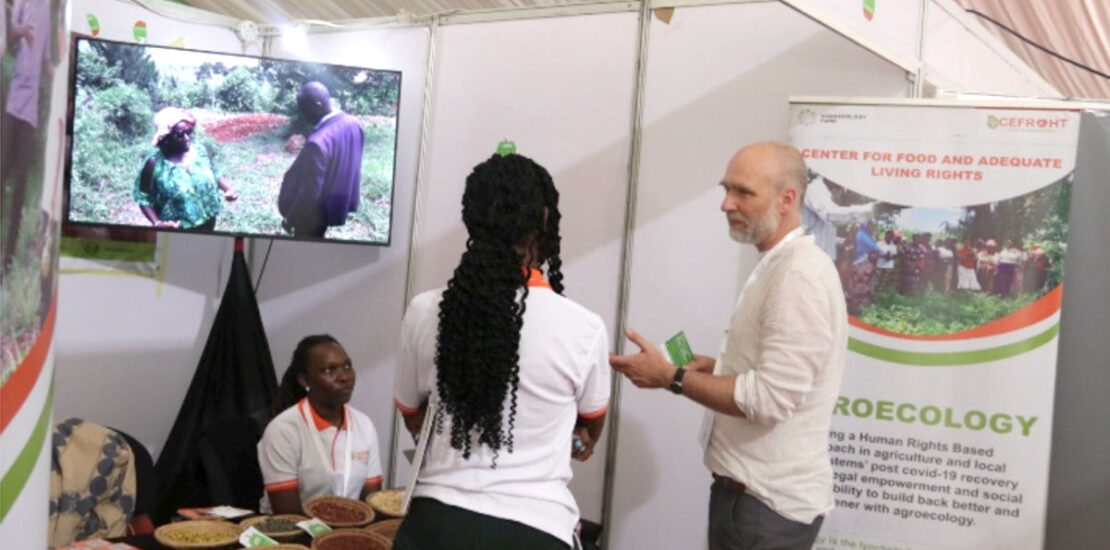CEFROHT Champions Seed Equity and Farmers’ Rights Across Africa
- April 10, 2025
- Posted by: CEFROHT Reporter
- Category: Agroecology

At the Centre for Food and Adequate Living Rights (CEFROHT), seed equity, sovereignty, and the protection of farmers’ rights are fundamental pillars of our mission to create just, sustainable, and inclusive food systems across Uganda and the African continent. We believe that control over seeds is a cornerstone of food sovereignty, ecological resilience, and community self-determination. Seeds are not simply agricultural inputs; they are a source of life, identity, biodiversity, and culture.
Yet today, the traditional rights of African farmers—especially smallholder women and youth—to save, exchange, and sell their own seeds are under growing threat from restrictive legal frameworks, commercial seed systems, and trade-related intellectual property regimes that favour industrial agriculture and corporate control.
CEFROHT has developed strategic partnerships with national institutions, including the National Seed Bank, to promote the multiplication, preservation, and fair distribution of indigenous and farmer-preferred seed varieties. This partnership supports smallholder farmers in accessing climate-resilient, locally adapted, and ecologically sound seeds that support the transition to agroecology.
We are also working towards the establishment of Community Seed Banks—community-owned seed repositories that serve as a foundation for seed sovereignty, biodiversity conservation, and local seed access. These seed banks are being integrated within our established agroecology learning centres located in Kiboga District, Naggalama (Mukono District), and Nansubuga (CEFROHT Learning Centre).
These centres are hubs of community-led innovation, knowledge exchange, and agroecological learning. They serve as platforms where farmers come together to learn, practise, and preserve traditional seed systems, share experiences, and access high-quality local seed varieties.
Recognising the urgent need to build the next generation of agroecology stewards, CEFROHT is training youth farmers in seed sovereignty and agroecological practices, particularly within the learning centres in Kiboga, Naggalama, and Nansubuga.
Youth participants are equipped with practical skills in seed identification, selection, and sorting; seed grading, storage, and preservation; and documentation of traditional seed knowledge.
These hands-on trainings foster not only technical skills but also a deep understanding of the social, ecological, and political value of seeds. Through this, CEFROHT is building a cadre of youth leaders who are actively defending and reviving community-based seed systems.
CEFROHT promotes a human rights-based approach to seed governance, recognising that the ability to save, use, exchange, and sell seed is a human right intrinsically linked to the right to food and nutrition, the right to adequate living and livelihood, and the right to participate in cultural and agricultural life.
Our legal and advocacy interventions aim to influence national and regional seed laws and policies to reflect the needs and rights of smallholder farmers, challenge restrictive laws that criminalise traditional seed practices, and advocate for the implementation of international instruments such as the International Treaty on Plant Genetic Resources for Food and Agriculture (ITPGRFA) and the UN Declaration on the Rights of Peasants and Other People Working in Rural Areas (UNDROP).
One of the most critical threats to seed sovereignty in Africa today is the imposition of intellectual property (IP) regimes, such as UPOV 1991, through trade agreements like the African Continental Free Trade Area (AfCFTA). These regimes seek to commercialise seeds and restrict farmers’ rights to save and share them.
CEFROHT is firmly opposed to the extension of industrial IP models to farmer seeds. We are advocating for alternatives to UPOV 1991 that respect farmers’ innovations and traditional knowledge; engaging in trade policy dialogues to ensure the AfCFTA does not undermine local seed systems; and supporting a sui generis legal framework for seed governance that reflects African realities, values, and ecological needs.
To support farmers in asserting and defending their rights, CEFROHT employs legal empowerment and strategic litigation approaches. Through our legal aid clinics, mobile legal camps, and community sensitisation initiatives, we help farmers understand seed laws and their rights; provide legal support to communities affected by seed-related violations; train community paralegals to monitor and report violations; and engage with local governments to promote pro-farmer seed by-laws.
We also document success stories and testimonies from our learning centres, especially from youth and women farmers who have regained control over seed production, storage, and exchange.
CEFROHT’s work on seed equity and sovereignty is about more than seeds—it is about reclaiming power, protecting heritage, and building climate-resilient food systems rooted in justice and farmer agency. Through our partnerships, youth training programmes, community learning centres, and legal advocacy, we are working towards a future where African farmers have full rights and access to diverse, locally adapted seeds.
We call upon:
- Governments to enact laws that recognise and protect farmers’ seed rights;
- Trade negotiators to reject harmful IP regimes within the AfCFTA;
- Development partners to invest in community seed banks and agroecology education;
- Civil society and farmer networks to unite and amplify the call for seed sovereignty.
Seed is life. Seed is identity. Seed is power. At CEFROHT, we are committed to ensuring that this power remains in the hands of the people.
